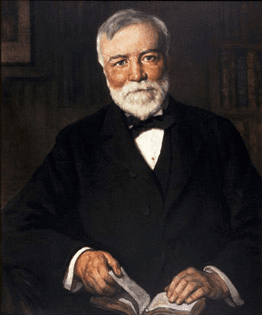Between 1892 and 1917, 104 communities in Iowa sought money from Andrew Carnegie to build public libraries.1 Ultimately, only 99 communities accepted the money, and those communities built 101 public libraries across the state. In addition to the public libraries that were built, Carnegie provided funds to build 7 academic libraries in the state. The active response of Iowa’s communities meant that Iowa received the 4th highest number of grants nationwide, and built the 6th highest number of public libraries. Iowa also acquired the 3rd highest number of academic libraries during the period of Carnegie’s program.
The Carnegie Libraries in Iowa Project (CLIP) seeks to chart the history of Iowa’s Carnegie libraries by creating a publicly accessible digital library of images as well as other documentary and statistical information. Library users are encouraged to explore the history of Iowa’s Carnegie libraries in the context of their changing communities.
48 public Carnegie library buildings still in use as libraries:
Albia, Alden, Ames, Atlantic, Audubon, Bedford, Bloomfield, Chariton, Cherokee, Clear Lake, Clinton, Colfax, Cresco, Denison, Dubuque, Eldon, Estherville, Glenwood, Hamburg, Hampton, Hawarden, Humboldt, Jefferson, Knoxville, Leon, Logan, Malvern, Manchester, Maquoketa, Marengo, Missouri Valley, Mount Ayr, Nashua, Odebolt, Onawa, Osceola, Oskaloosa, Ottumwa, Red Oak, Reinbeck, Shenandoah, Sibley, Tipton, Traer, Villisca, Vinton, West Liberty, Woodbine.
45 public Carnegie library buildings still exist but are no longer used as libraries:
Algona, Carroll, Cedar Rapids, Charles City, Clarinda, Corydon, Council Bluffs, DeWitt, Dunlap, Eagle Grove, Eldora, Emmestburg, Fairfield, Fort Dodge, Greenfield, Indianola, Iowa City, Iowa Falls, Lake City, Laurens, LeMars, Marion, Marshalltown, Mason City, Montezuma, Monticello, Mount Pleasant, New Hampton, Osage, Pella, Perry, Rockwell City, Sac City, Sanborn, Sheldon, Sigourney, Sioux City Main, Sioux City Leeds Branch, Spirit Lake, Storm Lake, Tama, Waterloo East, Waterloo West, Waverly, Winterset.
8 public Carnegie library buildings no longer exist:
Britt, Cedar Falls, Davenport, Garner, Grundy Center, Newton, Spencer, and Stuart.
1 academic Carnegie library building is still in use as a library:
Upper Iowa University (Fayette).
4 academic Carnegie library buildings still exist but are no longer used as libraries:
Cornell College (Mount Vernon), Drake University (Des Moines), Ellsworth College (Iowa Falls), and Grinnell College (Grinnell).
2 academic Carnegie library buildings no longer exist:
Parsons College (Fairfield) and Simpson College (Indianola).
1 George S. Bobinski, Carnegie Libraries: Their History and Impact on American Public Library Development (Chicago: American Library Association, 1969) is the primary source for statistical information about the Carnegie grants.
